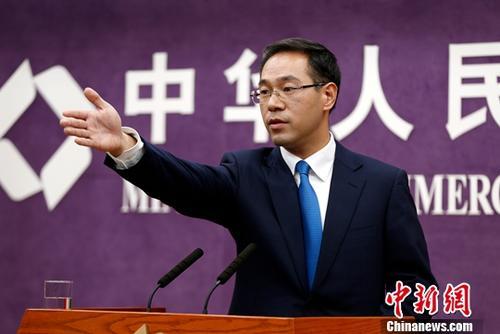
(File Photo: Chinanews.com)
US President Donald Trump said Tuesday he was sending a delegation of his top economic advisors to Beijing next week and there is "a very good chance of making a deal." The members of the US team will include Treasury Secretary Steven Mnuchin, trade representative Robert Lighthizer, National Economic Council Director Larry Kudlow and White House trade advisor Peter Navarro, according to the Wall Street Journal.
This is the clearest message sent by Washington so far that it hopes to settle trade disputes with China through negotiations. These disputes, widely regarded as a China-US trade war, have strained China-US relations and undermined global economic confidence. The composition of the US team reflects Washington's earnest search for a solution.
The US tariffs on Chinese steel and aluminum imports and Chinese tariffs on US goods including pork, apple and wine have all taken effect. Both countries announced tariffs of $50 billion on each other's imports. After the US threatened China with a new $100 billion tariff plan, China vowed to "follow through to the end." The trade war has upset business circles in both countries.
Nonetheless the upcoming visit of the US delegation doesn't mean an end to the dispute. It's very likely the two will fail to reach a deal. This is mainly because the US has misunderstood the situation. It misperceives mutually beneficial trade as Chinese "economic aggression" against the US. It is also stuck in an illusion that China's trade surplus with the US can be reduced by administrative means.
There are problems with the US economic and trade structures, including a low savings rate, a robust dollar, strict control over high-tech exports and a lack of competitiveness in US-produced daily necessities. The US needs to reform, but the White House wants other countries to pay for it.
Washington knows well that it's hard to advance reform within the US and is unwilling to loosen its grip on exports of high-tech products. Taking advantage of US strength to force trading partners to make concessions was the easiest choice, and so recent months have seen the US waving the big stick of trade sanctions. This is the root cause of the escalation of China-US trade conflicts.
As China's economic strength grows, it's a trend that it will further open up, broaden its market access and strengthen protection of intellectual property rights (IPR).
The series of landmark measures unveiled by President Xi Jinping at the Boao Forum for Asia are China's strategy to further expand opening-up.
But China will never yield to unreasonable US trade requirements, such as ensuring US competitiveness at the cost of China's technological progress. China has the right to develop its own high-tech industry based on respect for IPR and to buy IPR from others through fair trade. The US can neither contain China's high-tech development nor breach basic rules of trade to achieve its purposes.
Washington disregards fairness, is too self-interested and obsessed with the stick approach. This means Beijing must prepare for trade disputes that cannot be solved quickly. China doesn't want a trade war, but is not afraid of fighting such a war.
The US delegation is welcomed to China for talks and it's believed the Chinese side will also show its sincerity. But we shouldn't have any illusions. It is not a big deal even if no agreement is reached.


